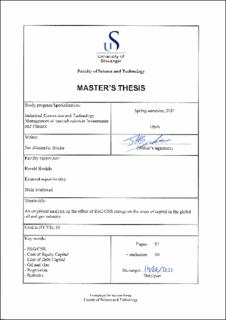| dc.contributor.advisor | Haukås, Harald | |
| dc.contributor.advisor | Svalestad, Svein | |
| dc.contributor.author | Bjerke, Jan Alexander | |
| dc.date.accessioned | 2021-09-29T16:29:56Z | |
| dc.date.available | 2021-09-29T16:29:56Z | |
| dc.date.issued | 2021 | |
| dc.identifier | no.uis:inspera:78874059:23328566 | |
| dc.identifier.uri | https://hdl.handle.net/11250/2786324 | |
| dc.description.abstract | This work examines the relationships between Refinitiv ESG scores and costs of equity and costs of debt capital for a sample of 231 companies in the global oil and gas industry across 965 firm-year observations from 2015 to 2020. Using univariate analysis and multivariate linear regressions, we find that high ESG/CSR scoring companies in the global oil and gas industry experience cheaper equity and debt financing than their peers with lower ESG/CSR scores. By looking deeper into the individual ESG Pillar scores, we find that oil and gas companies with higher Environmental Pillar scores are expected to experience lower costs of equity than peers with lower scores. Conversely, firms with high Social Pillar scores are expected to have higher costs of equity compared with lower scoring peers. On the debt side, oil and gas companies with higher Environmental and Governance Pillar scores are expected to experience lower costs of debt compared with lower scoring peers. Our main findings are mostly consistent with arguments in the literature on the relationship between ESG/CSR and costs of capital in general, but we are cautious to draw causal conclusions and do not interpret our results as an exact representation of reality. We call for further industry specific research on this relationship to enable comparison across business models, and eventually establish causal inference. | |
| dc.description.abstract | This work examines the relationships between Refinitiv ESG scores and costs of equity and costs of debt capital for a sample of 231 companies in the global oil and gas industry across 965 firm-year observations from 2015 to 2020. Using univariate analysis and multivariate linear regressions, we find that high ESG/CSR scoring companies in the global oil and gas industry experience cheaper equity and debt financing than their peers with lower ESG/CSR scores. By looking deeper into the individual ESG Pillar scores, we find that oil and gas companies with higher Environmental Pillar scores are expected to experience lower costs of equity than peers with lower scores. Conversely, firms with high Social Pillar scores are expected to have higher costs of equity compared with lower scoring peers. On the debt side, oil and gas companies with higher Environmental and Governance Pillar scores are expected to experience lower costs of debt compared with lower scoring peers. Our main findings are mostly consistent with arguments in the literature on the relationship between ESG/CSR and costs of capital in general, but we are cautious to draw causal conclusions and do not interpret our results as an exact representation of reality. We call for further industry specific research on this relationship to enable comparison across business models, and eventually establish causal inference. | |
| dc.language | eng | |
| dc.publisher | uis | |
| dc.title | An empirical analysis on the effect of ESG/CSR ratings on the costs of capital in the global oil
and gas industry | |
| dc.type | Master thesis | |
